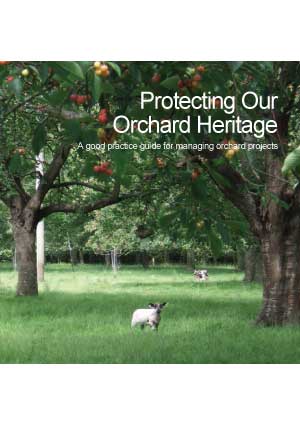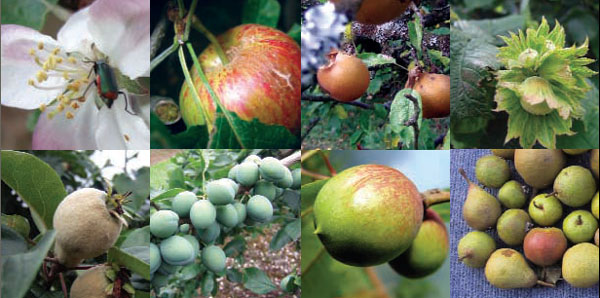
Protecting our Orchard Heritage - a good practice guide for managing orchard projects
ISBN: 978-1-903060-46-9 128pp - 2008 | 4810Kb

Protecting our Orchard Heritage - a good practice guide for managing orchard projects
ISBN: 978-1-903060-46-9 128pp - 2008 | 4810Kb
 This publication aims to help orchard projects by supporting practitioners and local communities to enhance, protect and celebrate orchards.
This publication aims to help orchard projects by supporting practitioners and local communities to enhance, protect and celebrate orchards.
The orchard heritage organisation Common Ground calculates that, since 1950, nearly two thirds of England's orchard area has been destroyed. In some counties, the tally is even more striking - Devon has lost 90% and Kent over 80% since the 1960s. This is largely attributed to land development for other uses such as housing, the lack of legal protection for orchards, and commercial pressures on farmers to produce more profitable crops, alongside competition from cheap imports.
Orchards are like many-faceted jewels that connect us to our heritage, a plethora of wildlife and fruit varieties, and wonderful opportunities to enjoy traditional agricultural landscapes and customs.
Managed appropriately, even in a time of highly competitive food marketing, orchards can bring economic benefits to local communities, especially when they build on distinctive characteristics and provenance to build customer interest and support.
Research for this good practice guide revealed that traditional and smaller orchards can be restored and conserved, but this needs considerable enthusiasm, community and other support, and not least, creativity. We can also learn from other European countries such as France, Italy, Spain and Germany, where vineyards, olive groves and fruit and nut orchards are still important and prominent aspects of the landscape, culture, gastronomy and economy, and receive legal and marketing support from regional and national authorities.
During 2006 and 2007 Sustain; the alliance for better food and farming worked with Leader+ to develop an Orchard Co-operation Project to bring together experience from sustainably managing orchards in six Leader+ areas: Herefordshire Rivers; Somerset Levels & Moors; Teignbridge; North West Devon; Mid Kent Downs; and Cumbria Fells & Dales.

The Orchard Co-operation Project culminated in production of this good practice guide for orchard project management. Its purpose is to help current and future orchard projects, supporting practitioners and local communities in enhancing and protecting orchards. It focuses on setting up and running orchard projects, giving practical advice on project-management issues such as setting objectives, fundraising, good communications and measuring successes, and finally explores possible challenges for the future. It draws on many successful examples of Leader+ and similar projects, and other orchard-related activities around the UK and elsewhere. We hope that this good practice guide will inform and inspire orchard enthusiasts everywhere, to take practical action to conserve our orchard heritage for the enjoyment of generations to come.
Publication contents
Foreword
Chapter 1: Introduction
Chapter 2: Finding out more about your orchard
Chapter 3: Exploiting the many benefits of orchards
Chapter 4: Attracting funding and other support
Chapter 5: Looking to the Future…
Appendices
Orchards Project: During 2006 and 2007, Sustain worked on a national orchard project with Leader+ (European Union funded programme of rural development) to conserve and bring into sustainable management traditional orchards in 6 Leader+ funded areas: Hereford Rivers; Somerset Levels & Moors; Teinbridge; North West Devon; Mid Kent, and Cumbria Fells & Dales.
Sustain
The Green House
244-254 Cambridge Heath Road
London E2 9DA
020 3559 6777
sustain@sustainweb.org
Sustain advocates food and agriculture policies and practices that enhance the health and welfare of people and animals, improve the working and living environment, promote equity and enrich society and culture.
© Sustain 2025
Registered charity (no. 1018643)
Data privacy & cookies
Icons by Icons8